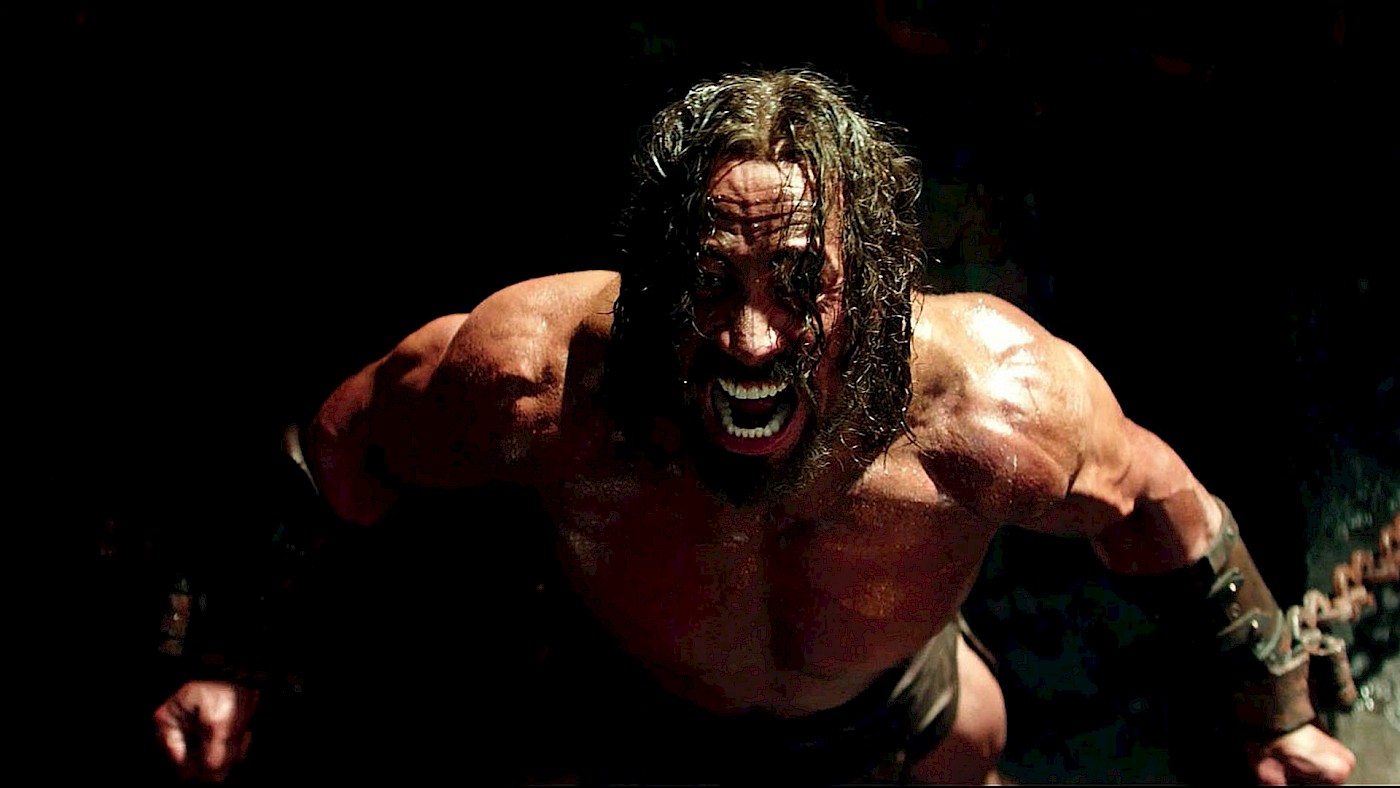Tonight, I went to see the new Hercules, starring Dwayne “The Rock” Johnson, in the cinema. The movie, directed by Brett Ratner, is ostensibly based on Steve Moore’s graphic novel Hercules: The Thracian Wars, which I reviewed just the other day. As you may be aware, this is the third Hercules movie released this year and it turns out to actually be the best of the three – although the other two didn’t exactly set the bar very high.
Before I get started with the review, I suppose I should point out that I saw the movie in 3D. I don’t have any particular strong feelings towards 3D. For the most part, I think movies work just fine as two-dimensional moving pictures. With this film, I don’t think that the 3D added anything in particular. There were a few moments where wood chips flew out from the screen or a spear reached out towards the audience, but for the most part the 3D was, as usual, largely superfluous.
Changes to the source material
The graphic novel on which the movie is based did not make it clear whether Hercules was truly a son of Zeus. The reader was also left to conclude for himself if the great labours that he performed were or were not wholly the creation of the narrator, Iolaus. The movie leaves nothing ambiguous: Hercules is not a demigod, nor did he perform his labours on his own. He is (just?) an exceptionally strong mortal who relies on the help of his companions to succeed in his tasks.
The trailers are deceptive: they suggest that we will see Hercules fight the Nemean Lion, the Erymanthean Boar, and the Lernaean Hydra. In reality, these sequences are all imagined by Iolaus, Hercules’ nephew. The animated end credits – which seem to be standard now with movies based on comic books – reveal the “truth behind the legend” by showing how Hercules did indeed fight and defeat these monstrously huge animals, but not on his own. While I deplore the fact that we haven’t seen a Hercules movie this year that fully embraced the supernatural elements in the manner of, say, Clash of the Titans, this movie did manage to work out all right within the limits that it set for itself.
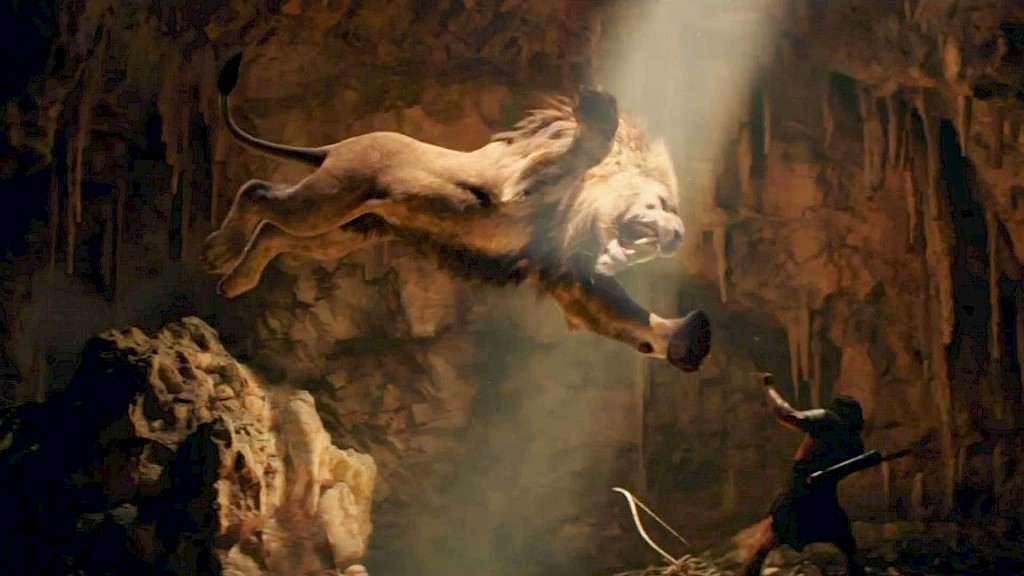
For the movie, the film makers did make some changes that I felt were unnecessary. In the original version of the story, Hercules is driven insane and slaughters his wife and children. The script writer altered this so that some random villain – Eurystheus, “king of Athens” (rather than Tiryns) – was responsible for the deaths of the hero’s family, a good example of what Edith Hall has recently called the “infantilisation of modern audiences”. Hercules’ slaughter of his spouse and offspring are what make the character deeply tragic and therefore interesting. In this movie, he seems to be just a muscle-bound hero looking for revenge.
Furthermore, some characters from the graphic novel were changed or removed. Meleager does not appear in the movie, which removes the interplay between him and Atalanta (Ingrid Bolsø Berdal). The latter is also turned into an Amazon from Scythia, who worships Artemis. (In Greek mythology, the Amazons were actually “Daughters of Ares”, and Atalanta came from Aetolia.) There is also no trace of Atalanta’s back story from the graphic novel; here, she is just an attractive warrior woman.
Meneus, the adolescent boy beloved by Hercules in the graphic novel, was removed, presumably because Hollywood is still uncomfortable with a movie set in ancient Greece that features a strong male lead in an amorous relationship with a younger man. In the movie, Hercules’ nephew Iolaus (Reece Ritchie) does double duty as a stand-in for Meneus.
Tydeus (Aksel Hennie), who was a brain-eating cannibal in the graphic novel, is turned into a noble if brutish mute in the movie, who only at the very end is able to utter a single word: the name Hercules. Of all the characters, he is perhaps the most different from his incarnation in the graphic novel. Perhaps the writer or director was afraid that he would steal too much of The Rock’s thunder if they gave him as prominent a role as in the book.
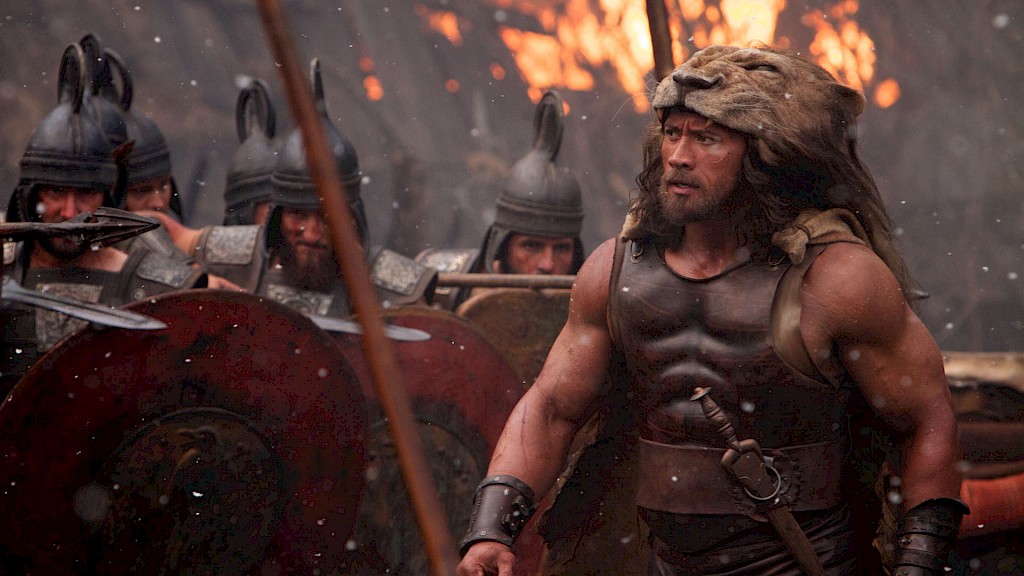
On the Thracian side of the cast, Ergenia (Rebecca Ferguson), the king’s daughter, is made into a sympathetic character with a son, and manages to survive to the end. In the graphic novel, she was duplicitous and is ultimately killed. King Cotys (John Hurt) is older and more feeble than the character in Steve Moore’s book. Tobias Santelmann, who plays Rhesus, is largely nondescript and even disappears completely toward the end of the movie. His plot line is never satisfactorily resolved.
A curious change from the graphic novel is that the movie is no longer set in the Bronze Age, but very specifically in 358 BC. There seems to be no cogent reason for this change. The weapons, armour, and architecture is again this curious mix of archaeologically-inspired objects from different eras, with a propensity for the overuse of leather armour and those ridiculous leather braces. Some of the armour and helmets seem to be virtually identical to that last seen in Wolfgang Petersen’s movie Troy (2014), and I would not be surprised if these were indeed re-used. To add insult to injury, a leather cuirass is shown at one point and referred to as a linothorax. That Greek word actually refers quite clearly to a linen corslet.
There is a sequence in the movie where it becomes clear that the Greeks have never before seen men ride on horses and believe them to be centaurs. While the Mycenaeans knew that horses could be ridden (there are a few figurines that depict men on horseback), it is not inconceivable that the notion was still fairly new and that therefore horsemen could be mistaken for centaurs. But the movie is set in 358 BC, the Classical period, an age when cavalry was common in Greece and the rest of the ancient world. Worse still, Hercules and his companions use chariots, which would have been a curiously archaic mode of transportation in everyday life, let alone on a Classical battlefield.
All about the characters
But Hercules is clearly not meant to be historical. It is mostly about the characters and especially about Hercules and his mercenary compatriots. While none of them are very deep, they are, on the whole, interesting enough to keep the viewer engaged. Dwayne Johnson is serviceable as Hercules, even if he plays him a little too straight. Rufus Sewell, who plays Autolycus, and Ian McShane, who portrays the seer Amphiraus, get most of the best lines and comedic moments, and McShane in particular manages to steal the show. The rest of the cast is left with scraps. Rebecca Ferguson’s Ergenia is largely flat and uninteresting, while John Hurt’s cowardly King Cotys comes across as largely ineffectual and not much of a threat.
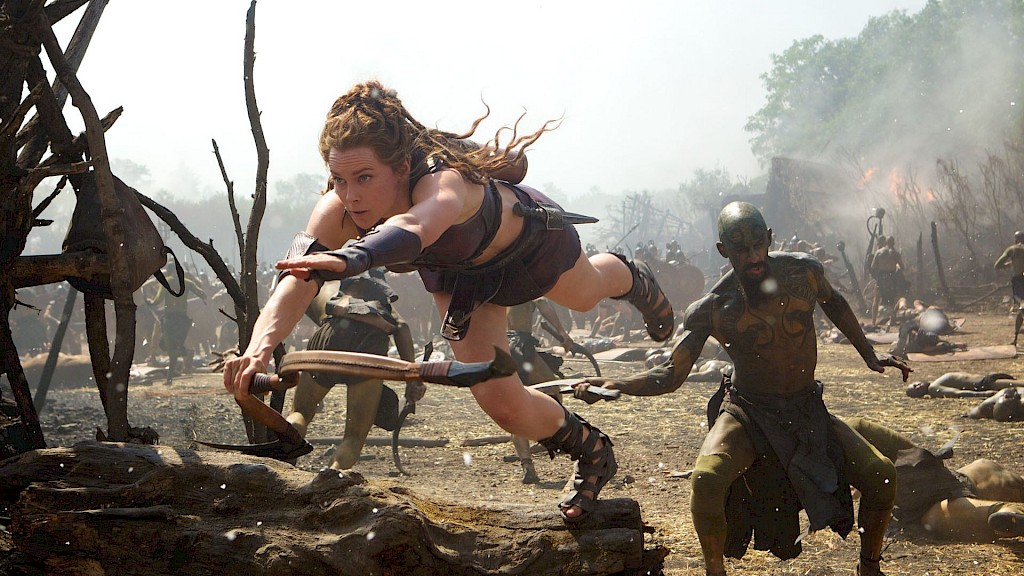
The plot of the movie is, by and large, the same as the graphic novel, with some extraneous parts weeded out. Hercules and his companions are hired by Cotys to train the Thracians to fight. Rhesus is introduced as a villain, but after his defeat it is revealed that Cotys is actually the real enemy. For the movie, Cotys joins forces with Eurystheus to conquer Greece, a plot that is quickly resolved when Hercules kills the foppish “King of Athens” and thus gains revenge for the death of his wife and children. Cotys attempts to defeat Hercules using his army, but after the Greek hero topples over a gigantic statue of Hera and destroys her temple, killing Cotys in the process, the Thracians surrender their arms.
The movie has some pacing issues. The opening is relatively strong and does a good job introducing the protagonists and setting the tone for the movie. After that, the movie wallows around for a bit until it reaches the large battle scene between the armies of Cotys and Rhesus. The fight choreography is interesting, but I felt that the scene dragged on for too long. Oddly enough, a lengthy training montage is shown after the massive battle with Rhesus’ forces. After this, the movie becomes quite boring: the middle part is clearly the weakest.
However, once Hercules and his companions get captured by Cotys’ men, the movie picks up again. Dwayne Johnson does his best to channel the magnificent Steve Reeves in the scene where he tears his chains from the ground and attacks his captors. This sequence was, in my opinion, quite effective. The finale I found to be strangely similar to the denouement in Conan the Barbarian (1982): a bit of a cop out, but still acceptable.
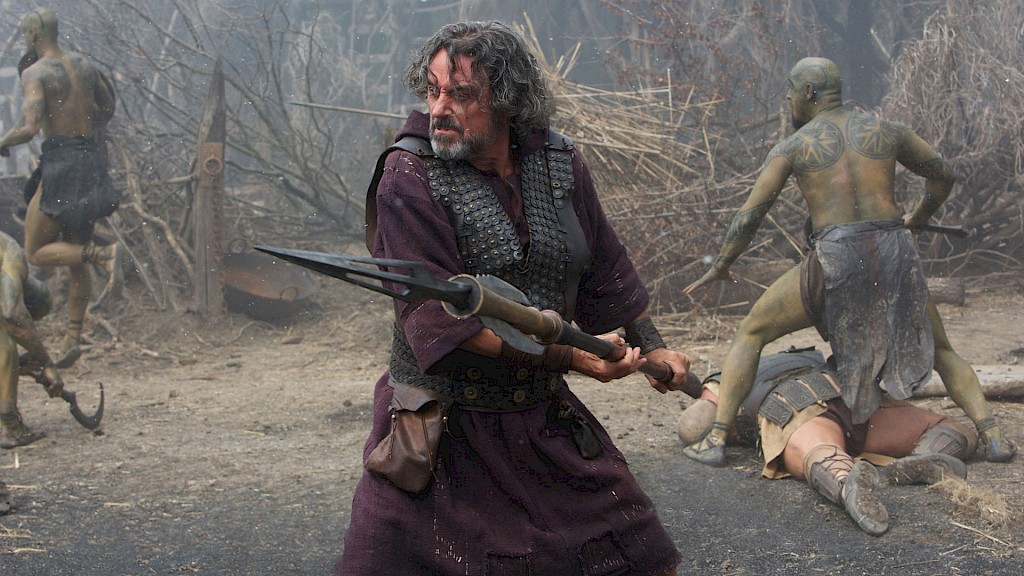
Aside from some strong and interesting characters, two particular aspects of the movie put this one head and shoulders above The Legend of Hercules and, of course, Hercules Reborn. The first is that this movie, despite being rated PG-13 in the States, isn’t completely toothless.
While there is no abundance of blood, there is sufficient violence to make it feel more authentic (for want of a better word), and I was particularly impressed by the booming sounds made whenever Hercules’ club connected with enemy flesh and bone.
The second aspect is that the movie actually has some funny moments and dialogue. It certainly doesn’t revel in light-heartedness and there is still plenty of drama, but it isn’t as dry and dour as The Legend of Hercules, or as humourless as Hercules Reborn.
Before you leave
To be perfectly clear, this movie is not a masterpiece by any stretch of the imagination. However, considering the other movies based on the Greek hero that were released this year, this wasn’t all that bad and might even be interesting enough to view again.
It’s definitely not without its flaws, but if you regard it as a fantasy movie that features some characters drawn from Greek mythology, it’s actually all right. And who knows, maybe someday, someone will swing round, look at the mistakes made in this movie, and then make a really good film about Hercules. We can dream, right?
